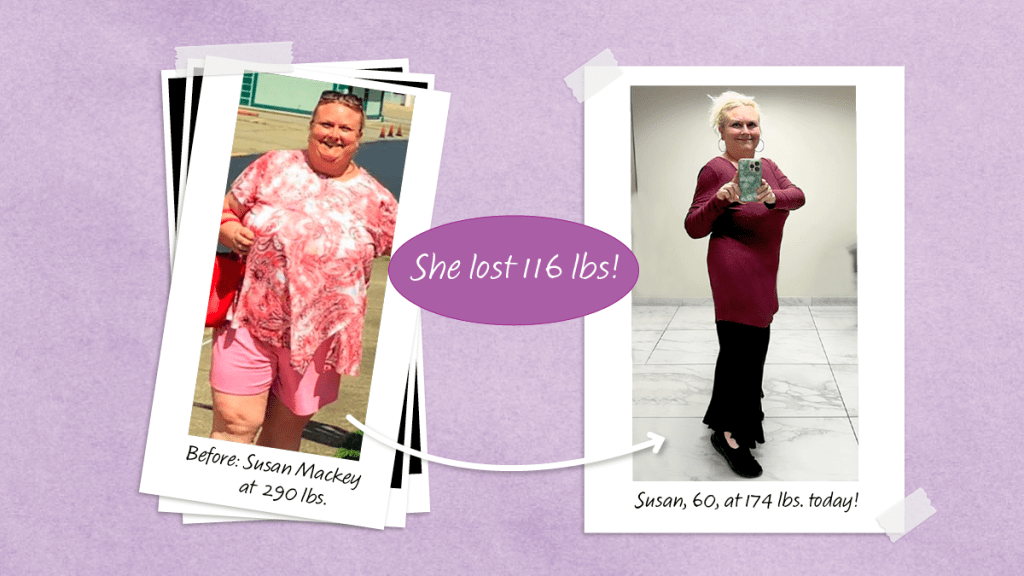Weight loss drugs like Ozempic and Wegovy have dominated the diet discussion for the past few years. But this trend leaves many people wondering: What role does weight-loss surgery play in an Ozempic-obsessed world? Weight-loss expert Fred Pescatore, MD, author of The A List Diet, says surgery is still part of our arsenal in fighting this epidemic. He says, “we now have two successful ways to combat obesity—GLP-1 agonist drugs (like Ozempic) and bariatric surgery.” But is bariatric surgery better than Ozempic? “Bariatric surgery has evolved so much over the years—it is still the most powerful tool we have to treat obesity,” explains Shauna Levy, MD, director of bariatric surgery at Tulane University. Keep reading to learn all about the bariatric surgery vs. Ozempic debate and hear one woman’s amazing surgery success story.
Are people still having weight loss surgery these days?
Even though we hear about diet drugs a lot during the Ozempic era, weight-loss surgery is still popular and helpful. Worldwide, nearly 600,000 people undergo some form of weight loss surgery each year. For comparison, about 7.75 million adults in the U.S. are currently using injectable weight-loss drugs, according to a recent Gallup poll. And studies show that surgery can be lifesaving, lowering a person’s risk of premature death by up to 50 percent.

Dispelling weight-loss surgery myths with facts
Dr. Levy finds there is a lot of confusion surrounding weight-loss surgery these days. She addresses the top myths and shares some facts about this intervention…
- Myth: Surgery is too extreme and scary.
- Fact: “Patients don’t realize how quick bariatric surgery is. It is safer than having your gallbladder out, and it is performed using very small incisions,” says Dr. Levy.
- Myth: Surgery is too expensive.
- Fact: Bariatric surgery is often covered by insurance, while weight-loss medications are often not, unless they are prescribed for diabetes, says Dr. Levy.
- Myth: Surgery is only for people who need to lose 100+ pounds.
- Fact: “Patients who want to lose more than 15 percent to 20 percent of their total body weight can benefit from bariatric surgery,” she says, making the intervention a good option for people who don’t like the thought of weekly shots or the side effects like muscle loss associated with drugs. Click here to learn more about Ozempic side effects.
- Myth: You get the same results from injectable meds.
- Fact: When comparing bariatric surgery vs. Ozempic, surgery has the advantage. Let’s take a deeper look at bariatric surgery effectiveness, compared to Ozempic… Full gastric bypass can deliver more weight loss than medications. According to studies, Ozempic patients lost on average 15 percent total body weight and Zepbound patients lost on average 20 percent total body weight. For comparison, bariatric surgery can lead to 20 percent to 50 percent total body weight loss, according to The American Society for Metabolic & Bariatric Surgery.
Bariatric surgery benefits over Ozempic injections: Surgery helps you get off meds
Surgery can improve patients’ quality of life by reducing the amount of Rx drugs they need. Dr. Levy explains, “Many of the patients who undergo bariatric surgery do so because they want to get off of medication.” That includes diabetes drugs and other prescription meds they would be on for life if they continued to carry unwanted weight that damaged their health.
Tonya Spanglo underwent gastric sleeve surgery (sometimes called a sleeve gastrectomy) in 2019. “My life changed that day,” she says. She went on to lose a total of 280 pounds, raving, “I’m off all medications now!”
The stigma of weight loss surgery is lifting
Dr. Levy sees weight-loss drugs as an important tool, one that has helped the public realize obesity is a complex disease (involving factors like “food noise” cravings) and not a lack of willpower or a moral failing. That same enlightened awareness is spreading to weight loss surgery. But she adds, “Society at large has been so misinformed about the physiology of obesity for so long. We still have a lot of work to do to dispel stigma.” The good news: There are multiple options now to treat the disease of obesity so there’s a great choice for everyone for long term weight loss. Keep reading to learn about one woman’s life-changing transformation…

Bariatric surgery success story: Susan is the healthiest she’s ever been–at 60!
The first time Susan Mackey saw a family photo from her older daughter Angela’s wedding in 2020, her heart sank. I didn’t think I looked that big, she thought, depressed about the state of her health. I guess this is the wake-up call I need…
For the previous two years, it felt like Susan was stuck in a revolving door of hospital visits. She needed thyroid surgery, a hysterectomy and a hip replacement. “Doctors weren’t sure if I’d ever walk again, the level of bone deterioration was so bad.”
Susan also struggled with diabetes and had been overweight since childhood, despite trying Weight Watchers (20 times!), Nutrisystem, SlimFast, self-made diets, early versions of shots in her stomach, liquid diets, fasting, even a 400-calorie-a-day lettuce diet.
Suddenly seeing surgery as a viable option
Then one day, Susan’s younger daughter, Rachel, gave her an invitation. “Mom, I’m going to a seminar about bariatric surgery at the hospital. Why don’t you come with me.”
Susan had never considered bariatric surgery before. She thought, I’m skeptical, but I’ll attend to support Rachel. As soon as the doctor began to speak, Susan knew, This sounds like something that could really help me.
So in 2021, after medical and mental-health consults, this single mom underwent gastric bypass surgery. A surgeon made four tiny incisions in her abdomen. In the laparoscopic procedure, the size of Susan’s stomach was reduced to help redirect food to a different part of the digestive system, resulting in fewer calories absorbed. Susan says, “My recovery was hardly anything.” She told people, “Twenty years ago, weight-loss surgery was thought of as an extreme option. But it has become routine.”
Insurance covered the whole surgery cost
While health insurance coverage varies, Susan’s insurance paid 100 percent of the $63,000 cost back then. (These days, Dr. Levy says, “Surgery often costs about the same as paying for one year of GLP-1 meds.”)
Susan quickly adjusted to her new normal. For breakfast, she ate yogurt with fruit. For lunch, she enjoyed Mason jar salads (or “salad shakers”) with lettuce, chicken, veggies and blueberries, plus oil and vinegar. And for dinner, she used her George Foreman Grill to prepare chicken or fish. On weekends, she treated herself to protein pancakes with berries. Susan also took vitamins to ensure she was absorbing enough nutrients. She found that sugar upset her stomach, so she gave up soda and sweets. She shares, “I could live with that!”
Susan says: “We all need a dream to chase!”
It was worth it. Susan noticed, “Everything the doctor promised was happening. I was so thankful I had the surgery.” Her chronic acid reflux vanished overnight, and the weight melted away. She shed 50 pounds in the first two to three months. In two years, she was down 100 pounds. As her A1C dropped from 7 to 5.6, Susan was no longer diabetic. She was also able to get off two Rx meds. In all, her BMI fell from 46.1 to 29.6. “It was life-changing!” That’s not all: Her daughter had a different surgery, a gastric sleeve, and lost about 80 pounds.
Susan used surgery as a motivating tool to achieve her bigger life goals. She says, “I had the guts to try kayaking and paddleboarding. That would have been nearly impossible before.” Susan also explored local state parks, national parks and historic sites.
Now this history buff is rewriting her future. She’s planning a trip to hike the Grand Canyon. She also keeps lists in notebooks of all the things she wants to accomplish, and she’s ticking them all off one by one. She says, “The sky is the limit!”
Susan’s confidence has also expanded. There was a time when she only owned three pieces of clothing that fit, but she has built a new, slimmer wardrobe from chic thrifted finds and online items. “I feel really good about myself. I have never had that feeling before.”
Surgery isn’t “cheating”
Using surgery or drugs isn’t “cheating,” according to Susan. “I look at it as a gift we were given to reach over those hurdles and enjoy our life. It’s something that works for people who never had a chance before. You still have to put the time in, exercise and eat right.”
Dr. Levy adds that some surgery patients benefit from a combination of surgery and meds. “I see the disease of obesity like the cancer model in that it sometimes takes chemo and surgery to best treat.”
Now Susan says, “I’m 60 and this is the healthiest I have ever been.” Her advice to people battling weight: “It doesn’t matter what your age is. If you’re healthy enough for surgery, do it for yourself!”
This content is not a substitute for professional medical advice or diagnosis. Always consult your physician before pursuing any treatment plan.




